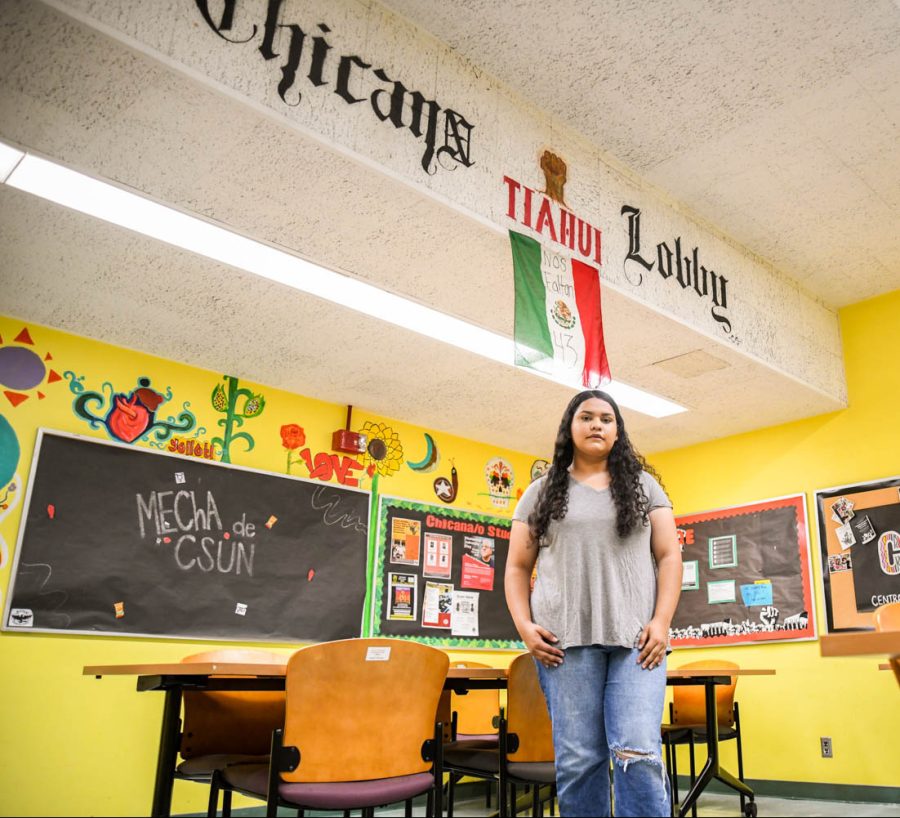Federal appeals court rules DACA unconstitutional
Crystal Esquivel in the Chicano Lobby in Jerome Richfield Hall at CSUN on Sept. 20, 2022, in Northridge, Calif.
December 21, 2022
A federal appeals court ruled Oct. 5 that the Deferred Action for Childhood Arrivals program is unconstitutional, and that new applications will not be accepted, though renewals are allowed. While the case is expected to be appealed in the Supreme Court, no date is set.
DACA was first introduced in 2012 by the Barack Obama administration through an administrative program, and was intended to temporarily protect people brought into the United States as children without authorization from deportation. The protection lasts two years, is renewable and protects around 800,000 people.
Although the program does not grant official legal status or a pathway to citizenship, it does allow DACA recipients to apply for a driver’s license, a Social Security number and a work permit.
The verdict was made by the U.S. Court of Appeals for the 5th Circuit. The ruling means that while the case continues its appeals process, current DACA recipients can renew their applications. However, this could end over the next few months, depending on future court decisions.
First-time applicants are still in limbo, and their applications are not being processed, including those who applied after May 2021.
This decision follows a ruling by federal Judge Andrew S. Hanen of the United States District Court in Houston, Texas. His ruling in 2021 stated that Obama had exceeded his authority as president when his administration created DACA back in 2012. The judge also stated that current DACA recipients were still allowed to retain their benefits.
In September of 2021, the Joe Biden administration appealed the ruling to the U.S. Court of Appeals for the 5th Circuit.
This past summer, the Biden administration published their final rule on DACA. This regulation is essentially a new version of DACA, which took effect on Oct. 31. This was done as an effort from the Biden administration to strengthen the policy, but this rule does not make any changes to who is eligible for DACA, and will not protect DACA from future legal challenges.
The ruling is nearly identical to the 2012 DACA ruling, with only a few differences. According to the ruling, one is a clarification that “expunged convictions, juvenile delinquency adjudications, and immigration related offenses characterized as felonies or misdemeanors under State laws” will not automatically make someone ineligible for DACA.
According to CSUN’s DREAM Center Supervisor Ivan Rendon, CSUN has one of the highest populations of students without legal citizenship status in the California State University system, with around 1,200 students. Rendon also said that the number of students who have DACA at CSUN is unknown, as CSUN does not keep track of who does and doesn’t have it.
“The verdict brings a lot of uncertainty for folks who already have DACA. They’re very much in a state where they’re facing additional stress and anxiety because of this decision,” Rendon said. “Not knowing what’s next and not knowing what they’re going to do, many have to start thinking about what will happen if they can’t keep their job or be able to use their degree.”
He also noted that the same holds true for students without legal status who never had DACA, saying that “the hope was always to see if DACA would accept new applications.” New applications have not been accepted since the Donald Trump administration announced they were phasing out DACA in 2017.
CSUN has taken steps to help their students without legal status by creating the “Undocumented Student Success Task Force.” Although it is not yet implemented, the task force has many plans for CSUN. The task force is comprised of students, staff and faculty whose goal is to bring more awareness and opportunities to the community. They also want to bring awareness to the fact that the community is incredibly diverse and is not just comprised of the Latino community.
“One of their main goals is to create a fellowship program which would allow folks who don’t have a Social Security number to be able to take advantage of the program and gain leadership skills and get paid for their contributions through the fellowship,” Rendon said. “The fellowship wouldn’t be something offered at just the DREAM Center. The task force is trying to expand it to all departments on campus so that students can take advantage of it based on their major or field of study.”
Although still in its early stages, the task force is working to support students and staff alike through free legal counseling and grants. Currently however, more resources can be found at the DREAM Center where they offer free legal services and a DACA assistance grant which pays for the renewal fee.
